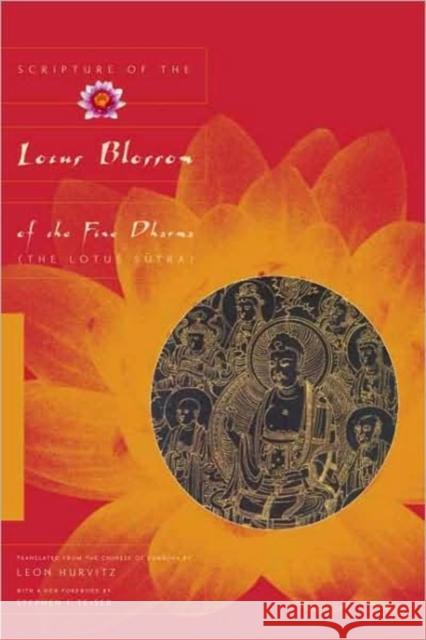Scripture of the Lotus Blossom of the Fine Dharma » książka
topmenu
Scripture of the Lotus Blossom of the Fine Dharma
ISBN-13: 9780231148948 / Angielski / Twarda / 2009 / 416 str.
Scripture of the Lotus Blossom of the Fine Dharma
ISBN-13: 9780231148948 / Angielski / Twarda / 2009 / 416 str.
cena 653,69
(netto: 622,56 VAT: 5%)
Najniższa cena z 30 dni: 644,87
(netto: 622,56 VAT: 5%)
Najniższa cena z 30 dni: 644,87
Termin realizacji zamówienia:
ok. 16-18 dni roboczych.
ok. 16-18 dni roboczych.
Darmowa dostawa!
Originally published in 1976, Leon Hurvitz's monumental translation of the Lotus Sutra is the work scholars have preferred for decades. Hailed by critics as an "extraordinary" and "magnificent" achievement, Hurvitz's translation is based on the best known Chinese version of the text and includes passages of the original Sanskrit that were omitted from the Chinese.
Beloved for its mythology and literary artistry, the Lotus Sutra is one of the most popular and influential texts of Mahayana Buddhism, asserting that there is only one path to enlightenment, the bodhisattva path, and that all followers without exception can achieve supreme awakening. The text argues that the Buddha cannot be delimited by time and space and that a common intent underlies the diversity of Buddhist teachings. Through parables of the burning house, the wayward son, and other tales that have come to be known throughout East Asia, the sutra skillfully concretizes abstract religious concepts and clarifies bold claims about the Buddhist tradition. Urging devotees to revivify doctrine through recitation and interpretation, the sutra powered an organic process of remaking that not only kept its content alive in the poetry and art of premodern Asia but also introduced new forms of practice and scriptural study into contemporary Buddhism. Stephen F. Teiser's foreword addresses this vital quality of the sutra, discusses its background, and reflects on the enduring relevance of Hurvitz's critical work.










